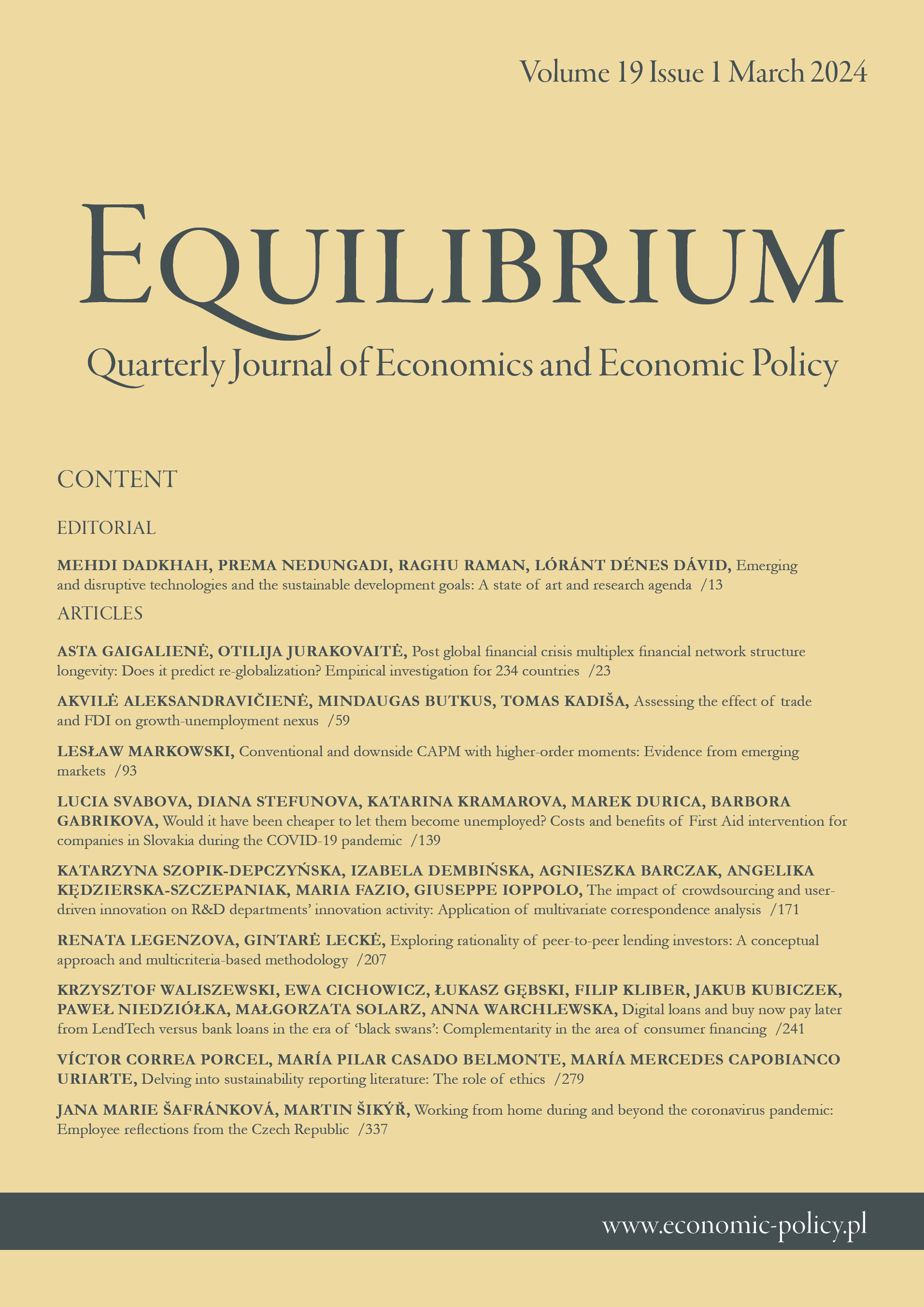Kohonen网络在捷克贸易部门领导者识别中的应用
IF 6.2
Q1 ECONOMICS
Equilibrium-Quarterly Journal of Economics and Economic Policy
Pub Date : 2019-12-31
DOI:10.24136/eq.2019.034
引用次数: 19
摘要
研究背景:贸易部门被认为是经济的力量,尤其是在发展中国家。就捷克共和国而言,这一国民经济领域是第二大雇主,同时也是国民生产总值的第二大贡献者。除了传统的商业分析和识别领导者的方法外,人工神经网络也被广泛使用。这些网络在经济领域越来越受欢迎,尽管它们的潜力尚未得到充分利用。本文的目的:本文的目的是利用Kohonen网络分析捷克共和国的贸易部门,并确定该领域的领导者。方法:数据集由2016年在捷克共和国从事贸易活动的11604家企业的完整财务报表组成。使用Kohonen网络对数据集进行聚类分析。对单个集群进行绝对指标和股本回报率分析,除其他指标外,这显示了单个集群对潜在投资者的特殊吸引力。还分析了单个集群的平均数量和绝对数量,这意味着指出了贸易部门最成功的企业集群。研究结果与附加值:研究结果表明,相对较小的企业群体对包括整个经济在内的贸易部门的发展产生了巨大影响。对319家企业的分析结果表明,可以预测贸易部门的未来发展。尽管如此,很明显,贸易部门在2016年表现不佳,这意味着所有者的投资很少。本文章由计算机程序翻译,如有差异,请以英文原文为准。
The application of Kohonen networks for identification of leaders in the trade sector in Czechia
Research background: The trade sector is considered to be the power of economy, in developing countries in particular. With regard to the Czech Republic, this field of the national economy constitutes the second most significant employer and, at the same time, the second most significant contributor to GNP. Apart from traditional methods of business analyzing and identifying leaders, artificial neural networks are widely used. These networks have become more popular in the field of economy, although their potential has yet to be fully exploited. Purpose of the article: The aim of this article is to analyze the trade sector in the Czech Republic using Kohonen networks and to identify the leaders in this field. Methods: The data set consists of complete financial statements of 11,604 enterprises that engaged in trade activities in the Czech Republic in 2016. The data set is subjected to cluster analysis using Kohonen networks. Individual clusters are subjected to the analysis of absolute indicators and return on equity which, apart from other, shows a special attraction of individual clusters to potential investors. Average and absolute quantities of individual clusters are also analyzed, which means that the most successful clusters of enterprises in the trade sector are indicated. Findings & Value added: The results show that a relatively small group of enter-prises enormously influences the development of the trade sector, including the whole economy. The results of analyzing 319 enterprises showed that it is possible to predict the future development of the trade sector. Nevertheless, it is also evident that the trade sector did not go well in 2016, which means that investments of owners are minimal.
求助全文
通过发布文献求助,成功后即可免费获取论文全文。
去求助
来源期刊
CiteScore
9.20
自引率
3.50%
发文量
28
审稿时长
36 weeks
期刊介绍:
Equilibrium. Quarterly Journal of Economics and Economic Policy is a scientific journal dedicated to economics, which is the result of close cooperation between the Instytut Badań Gospodarczych/Institute of Economic Research (Poland) and Polish Economic Society and leading European universities. The journal constitutes a platform for exchange of views of the scientific community, as well as reflects the current status and trends of world science and economy.
The journal especially welcome empirical articles making use of quantitative methods in: Macroeconomics and Monetary Economics, International Economics, Financial Economics and Banking, Public Economics, Business Economics, Labor and Demographic Economics, Economic Development, and Technological Change, and Growth.
Current most preferable topics and special issues:
The economics of artificial intelligence: business potentials and risks;
Digitalization and entrepreneurship in economics;
Sustainable socio-economic development, environmental and ecological economics;
Transition in the energy market (improving energy efficiency, alternative energy sources, renewable energy, energy security).

 求助内容:
求助内容: 应助结果提醒方式:
应助结果提醒方式:


